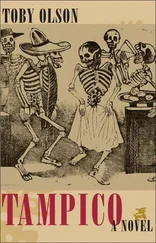Steve took a lot of time in studying his position. It was clear that he was trying to lock into the putt, but he could not keep himself from looking up, briefly checking the other ball and the man who had hit it. When he came around to the front of the green to check his line from that side, he said, “Mark yours,” and there was no request in his voice.
He’s locking in incorrectly, Allen thought. He’s used to giving orders; he didn’t mean to offend this time. He went over and marked his ball with a copper Danish krone he carried with him. The small, etched mermaid of the harbor nestled down in the close-clipped grass. He liked the sense of respect for occasion the coin gave to his game, respect for the green, its difficulties, and its social forms. The game could be compartmentalized that way into various forms. There were tee forms and fairway forms for iron shots and longer woods. The tee and green forms were the most social, and the codes of behavior for the green play were the most distinct and separate. Coming to the green was like a group of people arriving at a cocktail party or, depending on the kinds of events that got them there, like souls arriving at shelter in a storm. Once over the apron and onto the putting surface, there was room for some talk about modes of arrival, breakdowns, and sights seen on the way. But there was a time, very soon after the gathering in that circumscribed space, when that talk had an appropriate ending and the brief and intense party began.
There were responsibilities on the green, and there were space limitations and injunctions, and though these things could be seen from a distance only in physical movements and tasks, they were all social, matters of good taste, posture, and manners. Steve glanced up at him as Allen marked his ball and lifted it, then he went around to the other side of the green again, looking the putt over, plumbing it, checking to see in what direction the grass grew. Lou was standing on the back apron, his hand on his hip, one foot planted casually in front of the other. Frankie anticipated the task of replacing the flagstick in the hole when they were finished. He stood well away from Steve’s lines of study, but he would be quick to reach for the pin when the putting was over. These two had putted out, and having done that they thickened the social atmosphere.
Before anyone putted, the imaginary lines running from where the balls rested on the green to the cup were multiple and complex; they dictated where one might walk, and this in turn dictated who might stand by whom. There was little if any talk from one side of these lines to the other. Each player was intent on his own line and the study of the possibilities of break and pacing. As each putted and got down, he was free to give full attention to the putts of those who followed him. The limitations on movement in the physical area diminished as the amount of attention given to each putt increased. There were exceptions to this rule, but most often the last to putt was he who was in the position of winning the hole if his putt fell in, and it was he whom the others, freed from any concern with putts of their own, were watching with various unspoken desires and wishes.
The way such self-interest was handled and denied was through silence, demure standing back, in physical stillness, in postures of unconcern.
Allen felt that right now he could win it without putting. The fact that Steve was ready and aware of the psychological game possibilities was enough to make it likely. All he needed to do was speak. He was thinking, this is a speed putt, there’s too much break and trickiness in his line for him to risk trying to leak it in. If he had spoken this thought, he would have thickened the social matrix by interrupting Steve’s attention to the putt. The break in the attention would have been insignificant. Steve was good enough at golf for that not to bother him. It would have been Steve’s sense of the motive behind the talking that would have thickened things. He could have stood in crucial places, could have altered his expression in various ways, could have coughed or cleared his throat. But he did nothing, and it is possible that that in itself took its toll, because it was contrary to Steve’s expectations.
And he began to think, while Steve was working at getting ready, that this may well be the sense in which this game today was at bottom characterological. It was just that Steve could not possibly imagine that the man he was playing against now had certain standards that would not allow him to reduce the grandeur of the game they were playing to something that had to do with relationships between people. The stakes, the money, was something he accepted as the catalyst to what they were doing. For him, at one end of the hierarchical scale on which the money stood was the game played for pleasure, for practice and enjoyment. On the other end was the game played for life and death. With the stakes as given, the morals of the game entered.
These had to do with the other man and the ball and the ground to be covered. And that complex of tensions and chemistry was sacrosanct to him. At least he thought it was. It was not to be messed with, and he would not violate it. Steve’s limitations were moral; but at bottom his morals, those of business and power, were contradictory to those of golf. At least, this was the way Allen romanced it; this was why he knew Steve would lose, why he had already lost.
Steve stepped up to his ball finally, took a few smooth practice swings, and addressed it. He moved his head slowly from the head of his putter to the ball and down the imaginary line where he intended to send it. Out of the corner of his eye as he sighted he saw nothing. There was no opponent there, nothing for him to deal with, no one for him to exert power over. Even before he took his putter back for the stroke, his concentration was without attentive focus. When he struck the putt, he pushed it slightly, sending it out too far to the left. It caught the middle and not the down side of the slope that he wanted it to hit; it bent in toward the cup as it turned, but it did not bend enough.
He missed the cup by a good two inches on the high side, his ball coming to rest only a foot beyond it. When the ball stopped he tried to shrug, but he could not manage it. The shrug was like a tick in him. He stepped up and punched the ball home for his par.
Then it was Allen’s turn. Always his turn came. He never minded slowness of play, because his turn would always come up, and when that happened he would be alone again. It would be something else altogether. He never minded waiting for it, because of what it was. This one was for all of it, this one putt. Nobody else was involved in it. The mower had cut the green; he could hear it cutting another one in the distance. He could feel the slight wind. The birds were singing, and he picked out red-winged blackbird, brown thrasher, and catbird, isolating the differences in voice between the last two, then he released them.
He looked back up the fairway to the top of the mound. The faces in the pole looked away from him, the Indian at the top was turned away, high up, distant, and uninterested. He glanced at the other three. They were very still, very unimportant.
He smiled. He walked up to the putt, saw that it was straight with a slight curl to the left, just at the hole. He was close enough that he could just drive it home, with speed, taking the curl out of the putt. He decided instead to play the curl. All he had to do was hit the ball so that it would stop about a foot on the other side of the hole, play it into the right side. He stepped up to it. He sighted it, and then he stroked it. It came off the putter with some speed. About a foot from the hole it began to die. Six inches out on the right it slowed enough so that it could catch the break. It entered the middle of the cup, and fell in with that nice hollow sound. It never touched the back of the hole.
Читать дальше












